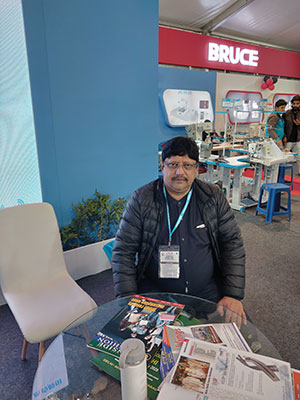FW
 Jack Sewing Machine Co., a leading China-based sewing technology company, launched its new Internet of Things (IoT) technology at the Garment Technology Expo (GTE) held from January 10-13, 2020 in New Delhi. Sudhakar Varma, Director of the Indian operations of the brand elaborates on this launch and its other initiatives.
Jack Sewing Machine Co., a leading China-based sewing technology company, launched its new Internet of Things (IoT) technology at the Garment Technology Expo (GTE) held from January 10-13, 2020 in New Delhi. Sudhakar Varma, Director of the Indian operations of the brand elaborates on this launch and its other initiatives.
Jack Sewing Machines was launched in India around 14 years ago. “Seven years ago we opened a liaison office in the country which enabled us to penetrate deeper into the market. It also enabled us to support new agents and launch new machines,” notes Sudhakar Verma, Director of the India Operations of the brand. Today, Jack offers technologies like wi-fi with IoT. In coming days, each of its products will offer cut to pack solutions for the industry.
According to Verma, exporters are looking forward to digitalisation of the industry. “We are ready with the app. Once the concept is ready we will sell this to the exporters,” he says. The brand provides both low and high-end machines. “The future for high end machines is quite bright as they require less labor and are more productive. People are showing a greater interest in the hanger system as it reduces hanging time while increasing needle time,” he adds.
Verma also recommends an increase in duty drawbacks. According to him, the industry should reconsider the levying of import duty on machinery. “Procedures for obtaining the TUF loan should be simplified. Fifteen years ago, exporters were granted good duty drawback amounts. Today, these have reduced to two to three percent,” he says.
For the last five years Jack has been concentrating on its C level fabricators and other domestic machines. “These ensure us of 100 percent growth in the domestic market. As a lot upcoming brands make men’s and women’s garments, their demand for machines is growing.
Earlier people would compare Japanese machines with Chinese ones. “However, no one makes machines in Japan today. Japanese companies manufacture their machines in China predominantly and some of it in Vietnam as these countries ensure a better quality and service besides very flexible & versatile eco-system,” adds Verma and in the same breath says sadly India is still nowhere in the global supply chain in this part of business.
The company has received a fantastic response for its products at the GTE exhibition. “Especially, our spreading machine has received an excellent response and helpus increase our business,” adds Varma.
 With more brands adopting the digital route to growth, traditional luxury market is in the midst of a seismic transformation. Millennial customers are opting for online shopping which is forcing many traditional luxury brands to sell their wares through ecommerce platforms.
With more brands adopting the digital route to growth, traditional luxury market is in the midst of a seismic transformation. Millennial customers are opting for online shopping which is forcing many traditional luxury brands to sell their wares through ecommerce platforms.
Indian luxury players are also catering to growing digital habits of their affluent consumers as it is influencing the decisions of these high-net-worth individuals. Over the last few years, there has been a considerable change in behaviors of these individuals. They now aspire to buy their LV or Gucci bag even before they buy their first automobile. Therefore, they seek the availability of these brands across online portals. Most of these online fashion portals use discount as a medium to lure customers, whereas, luxury brands stay away from regular discounting practices.
Digital is the future of luxury fashion
In its recent ‘Global Powers of Luxury Goods’ Deloitte highlights consumers now consider digital as being the future of luxury. Over 37 per cent of these consumers, in future luxury products and technology are likely to become more closely linked. Hence, luxury brands need to boost their ecommerce investments to offer a seamless shopping experience. For instance, in its bid to acquire the millennial consumer, Louis Vuitton, recently did live streaming of its ‘Fall Winter 2020 collection’ online.
Over 37 per cent of these consumers, in future luxury products and technology are likely to become more closely linked. Hence, luxury brands need to boost their ecommerce investments to offer a seamless shopping experience. For instance, in its bid to acquire the millennial consumer, Louis Vuitton, recently did live streaming of its ‘Fall Winter 2020 collection’ online.
Luxury brands often ignore reams of unstructured data. This includes consumer comments on social media, reviews, affluent influencers' photo feeds on Instagram, and engagements across multi-channel customer journeys. Brands can mine these to glean invaluable insight into their customer lifestyles, shopping preferences, and purchase behaviors.
Omni-channel emerges a viable option
Brands also need to be extra cautious while choosing an ecommerce platform to launch their luxury mono-brand online store. They need to choose the design, functionalities, ease of use and security of their store wisely as this will help them to deliver an exclusive experience, maintain brand loyalty and increase their sales performance. They should also align this online store to the brand’s global webstores and the physical stores to offer its latest global collection across regions.
Thus, ecommerce is no longer a sole option for brands to meet the evolving needs for their customers. They should instead opt for an omnichannel strategy which is emerging as the most viable choice for modern luxury retail.
On the upcoming occasion of International Women's Day, Alphabet Media has launched a specially curated gifting guide on behalf of all its representative brands. The guide contains detailed information on some of the most prominent womenswear brands in India.
One of the brands that the guide features is Raisin, a contemporary fashion brand for the modern age women launched by Bhumi Pednekar. Co-founded by Vikash & Vishal Pacheriwal, the brand represents everything a modern woman looks for - extreme comfort, affordability, and chic designs all wrapped up in one stylish piece of clothing.
Another brand featured in the guide includes Julahaa Sarees, a traditional hub for sarees. Offering a wide range of opulent jacquard weaves and designer embroideries for weddings and festivities, the brand blends traditional skills and craftsmanship into sarees.
YKK Corporation will continue to identify and reduce greenhouse gas emissions in its business activities, including raw material procurement, production processes, logistics, and the supply chain. Within the next two years it will set science-based targets consistent with what the latest climate science says is necessary to meet the goals of the Paris Agreement – to limit global warming to well-below 2°C above pre-industrial levels and pursue efforts to limit warming to 1.5°C. YKK aims to obtain Science Based Targets initiative certification.
YKK has become a signatory to the Fashion Industry Charter for Climate Action. The Fashion for Global Climate Action initiative calls on fashion industry to acknowledge the contribution of the sector to climate change and its responsibility to strive towards climate neutrality for a safer planet.
YKK joins more than 100 signatories to the Charter, which supports the goals of the Paris Agreement in limiting global temperature rise to less than 2°C above pre-industrial levels and sets specific goals for the entire fashion industry to implement. These goals focus on a 30 per cent aggregate reduction in greenhouse gas (GHG) emissions by 2030 and achieving net-zero emissions by 2050. The Fashion Industry Charter for Climate Action was launched under the auspices of United Nations Climate Change at COP24 (24th Conference of the Parties to the United Nations Framework Convention on Climate Change) in December 2018.
There was an increase in economic activity for US manufacturing in January. Manufacturing is expected to see an upward trend for the foreseeable future supported by the current macro-economic and political climate in the US. That growth will be driven in part by continued reshoring. Over 1,300 companies have announced their plans to reshore, and that can positively impact manufacturing plants, supply chains and supporting services. Recent trade agreements and tariffs continue to drive this shift. A tectonic shift is about to bring supply chains and jobs back to shores that exported them in previous years. Automation and industrial are two sector areas with possible investment opportunities. In the 1990s and early 2000s developments introduced a much cheaper labor force for US businesses, and companies took advantage of lower cost labor by moving their plants, factories and supply chains offshore. This created a substantial difference in US imports and exports, resulting in a large trade deficit. Eliminating the deficit may lead to five million new manufacturing jobs in the US.
Economic growth in the US is driven by consumer demand and a combination of labor growth and productivity gains. The over 60 million millennials are delaying buying cars and housing but are expected to become active when they start families.
The recent India International Knit Fair held in Tiruppur from February 17 to 19, 2020 showcased end-to-end products pertaining in the knitwear segment. The wide range of displays included summer/winter collections in knitwear for infants, children, men and women. Space dyed yarn garments made from mélange yarn dyed stripes and jacquard were displayed along with cotton, polyester, poly cotton, polyester-viscose blended fabric apparels. Garments made from banana cotton blends attracted visitors. These blends have 80 per cent cotton and 20 per cent banana fiber. Garments with reverse prints, cold pigment dyed 3D prints, acid spray styles, tie and dyed, bio washed, enzyme washed etc also were showcased. Manufacturers displayed special designs, different types of packaging methods and also visual merchandising.
Tiruppur is the knitwear capital of India. The share of Tiruppur knitwear exports in India’s total garment exports is 20 per cent. More than 80 per cent of the industries in this sector are medium and small scale. This is the right time for the knitwear sector to capture the market that’s leaving China, due to an increase in cost of manufacturing. Top brands, stores, wholesalers, importers see Tiruppur as one of the major sources for consumer’s requirements.
The Coronavirus (COVID-19) is expected to severely damage profitability of India’s spinning sector. Even though domestic cotton fiber prices continue to be competitive vis-a-vis international cotton prices, a further correction in international cotton prices amid demand-side uncertainties could render domestic spinners uncompetitive in international markets.
As for the performance of the Indian cotton spinning industry, it has already been severely constrained in the current fiscal amid multiple headwinds, including a demand slowdown in the domestic as well as export markets and unfavorable raw material prices. While the industry was pinning hopes on a gradual recovery in cotton yarn exports from the fourth quarter onwards, aided by softening of domestic cotton prices, the recent developments could prolong tough times for the domestic spinners. The domestic cotton spinning industry is highly dependent on exports, especially to China, where 30 per cent of the cotton yarn produced in the country is exported.
The outbreak in China and the consequent lockout in parts of the country resulted in a shutdown of production units in India, trickling down to lower demand for the yarn. The resultant correction in realisations, even as cotton prices have remained relatively stable on the back of scaled-up market interventions by the Cotton Corporation of India, are expected to contract spinners’ contribution margins.
Mango, the Spanish retailer is the recent addition, has announced its support for the Pakistan Accord, marking the first expansion of the International Accord for Health and Safety in the Textile and Garment Industry beyond Bangladesh.
The decision to support the Pakistan Accord aligns with Mango's Sustainable Vision 2030 sustainability strategy. This initiative aims to minimize the environmental and social impact of Mango's products and operations by focusing on "product, people, and planet." Mango publicly discloses its suppliers down to Tier 3 and collaborates with over 50 facilities.
The International Accord secretariat reported that over 50 brands and retailers have already joined the Pakistan Accord since January, with more expected to follow in the coming weeks.
The International Accord's 187 brand signatories collectively source garments and textiles worth over $2.6 billion from Pakistan. The secretariat anticipates that all 110 signatories with operations in the country will eventually participate, covering 500 to 700 facilities and benefiting tens of thousands of workers.
In addition to Mango, notable companies supporting the Pakistan Accord include Adidas, American Eagle Outfitters, Asos, Boohoo Group, Marks & Spencer, Puma, Uniqlo (owned by Fast Retailing), and more recently, Hugo Boss.
However, Levi’s has not so far signed the agreement.
Apparel exporters in Sri Lanka are impacted by disruptions of imported raw materials from China. Buyers are slashing orders as the novel Coronavirus (COVID-19) spreads into Europe, which is Sri Lanka’s largest export market. Factories in Sri Lanka are to be closed for a period of two to three weeks, while some are planning to prolong it until the raw materials arrive.
Ships are unable to carry cargo from Chinese ports because there is no cargo to be carried and several trading have been cut from shipping lines from Chinese ports.
The outbreak in China has hit India’s manufacturing and exports of medicines, electronics, textiles and chemicals. India sources about 70 per cent of active pharmaceutical ingredients and close to 90 per cent of certain mobile phone parts from China. Indian businesses are calling for cuts in import duties on antibiotic drugs, mobile parts and other items to help cope with the fallout from the coronavirus outbreak which has disrupted supplies from China. Credit with a backstop facility of guarantee may be offered for companies which have the capability to start immediate production of items that can feed into domestic consumption.
Indonesia plans to ease licensing procedures to import raw materials as its manufacturing sector is witnessing the impact of supply chain disruption from China caused by the Coronavirus (COVID-19) outbreak. Simplifying import procedures for raw materials would be one of the strategic measures to cope with the impact. Almost 500 companies will receive special permits to allow them to import raw materials from sources other than China. The raw materials imported by the 500 companies account for two-fifths of the country’s total raw material imports. There has been severe disruption to the supply of raw materials from China, especially for the plastic, textile, footwear, steel and chemical products industries of Indonesia.
Indonesia’s garment exports for the 10 month period until October 2019, decreased 3.6 per cent. The three biggest destinations for Indonesian garment exports are the United States, Japan and Germany. Until October 2019, the Indonesian garment market share in the US market fell from 4.6 in 10 months of 2018 to 4.4 per cent in 10 months of 2019. Growth in the textile industry and textile products in the third quarter of 2019 increased to 15.08 per cent. This achievement is much higher than the achievement in the same period in 2018, which is 10.08 per cent.












